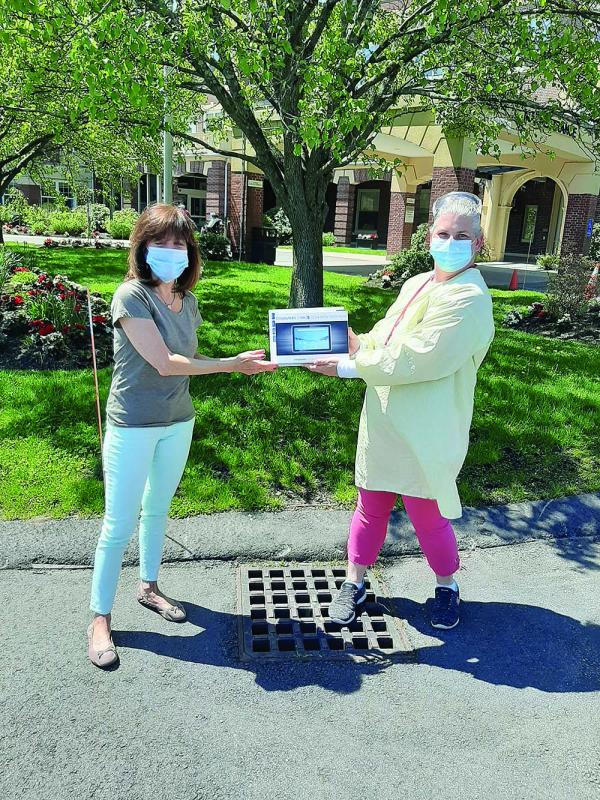May 28, 2020

Jeanne Shine, sister of Suzanne Vadala, a resident at The Boston Home in Dorchester, and Kerry Donohue, Activities Director, The Boston Home, display the computer tablet just delivered by Guardian Community Trust.
In an initiative aimed at combating the isolation forced upon seniors and residents with disabilities during the pandemic, a Massachusetts nonprofit last week provided tablets to beneficiaries in some 25 nursing homes across the commonwealth, two of them Dorchester facilities.
Guardian Community Trust, a nonprofit created to improve the lives of seniors and those with disabilities, delivered tablets last Thursday to the Boston Home on Dorchester Avenue and the Bostonian Rehab and Nursing Center on Neponset Avenue.
Thanks to the trust’s’ initiative, Suzanne Vadala, a resident with sclerosis at the Boston Home, will now be able to more easily stay in touch with her sister, Jeanne, and other family members.
Similarly, Karen Davis, a resident at the Bostonian with a brain injury and dementia, will be able to see the faces of her children, grandchildren, and other loved ones with the videoconferencing opportunities provided by her new computer.
Many Massachusetts residents have been spending most of their time inside to help prevent the spread of coronavirus, but for seniors and the disabled, the risk factors brought about by the pandemic have effectively trapped them in their homes, an indefinite reality with potential side effects of loneliness and other mental health challenges.
Guardian Community Trust saw tablets as a way to make a small but meaningful impact and help to address some of those issues.
“During this pandemic, many of our beneficiaries have been unable to see family for more than two months,” said Peter Macy, Community Trust’s executive director. “They are lonely and afraid. Access to a computer or tablet is providing a lifeline for them.”
Macy also noted that nursing home residents have been suddenly cut off from their loved ones, and their facilities often don’t have the means to offer video contact. “These hand-held tablets can make all the difference for them and their family members,” he said.
The need for the tablets was identified by social workers on the Community Trust staff after they talked with beneficiaries in nursing homes and their families. Jayne Gordon, a clinical relationship coordinator for the trust, pointed out that most of these residents do not know how to obtain or use mobile devices, and they would not be able to do so without the help of the trust and the staff at the nursing facility.
“Nursing home directors have welcomed the program,” she said, “and have generously made their own staff available to receive the tablets and help the residents get started. Being able to see their loved ones, and not just talk on the telephone, has been a tremendous improvement in our people’s quality of life during this awful crisis.”
Macy noted that there are both financial and material barriers to video communication for residents of nursing homes.
“Almost everyone in a nursing home relies on Medicaid, which does not allow them to have savings for something like a tablet. Pooled trusts are a vital exception, allowing us to hold their savings and use them to protect quality of life during their last years. Medical benefits alone simply cannot do all that is needed to survive emotionally in a nursing home environment.”
In addition to sourcing the tablets, Community Trust opens, inspects, and sets up each unit before it is delivered, installing and downloading email capability and creating a Zoom account. After the removal of unneeded applications from the desktop, the “On” button and “Open Tablet” instructions are marked with stickers so that the resident will be able to see exactly how to start. The tablet is then disinfected, repackaged, and delivered to the nursing home.
Social workers, activity directors or other nursing home staff receive the tablets, bring them to the residents and sit with them while they receive the first call. If a resident is able to learn how to accept and make calls, the tablet remains with him or her. For those not able to work the technology on their own, family members communicate with staff to schedule assisted calls.
“The nursing homes have been just wonderful in supporting this program,” Gordon said. “The tablets are going to people who would not have been able to obtain them on their own and are set up with home screens that are easy for seniors to negotiate and with email and Zoom accounts.
“We want to make life more livable for our older residents who are isolated from family and friends during this very difficult COVID-19 time period,” she said. “Like so many organizations, we are retooling to be useful and relevant and help others in this current unprecedented environment.”
The plight of nursing homes and other residential facilities has been an increasing concern during the pandemic, as clients face extreme isolation that no one expected when they were admitted. Additionally, as COVID-19 emerges in a large number of facilities across the Commonwealth, the residents deal daily with fear of infection.
Macy believes that the need for the tablets will continue until the infection rate in nursing homes is finally under control. “Testing obviously will make a difference if and when it becomes widely available,” he said. “Until then, the safety of residents will require painful isolation. We can only hope to make a positive difference.”



